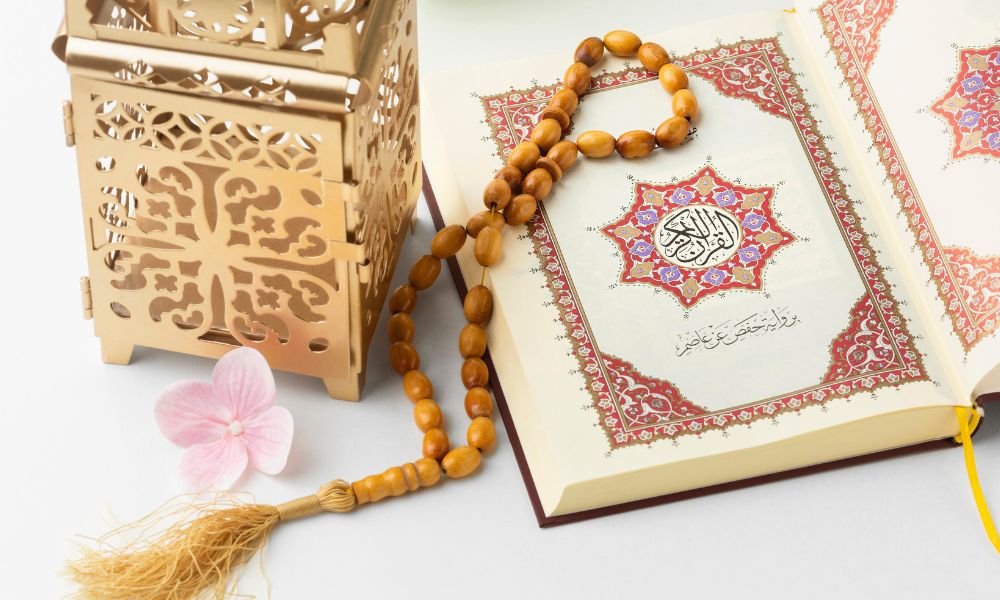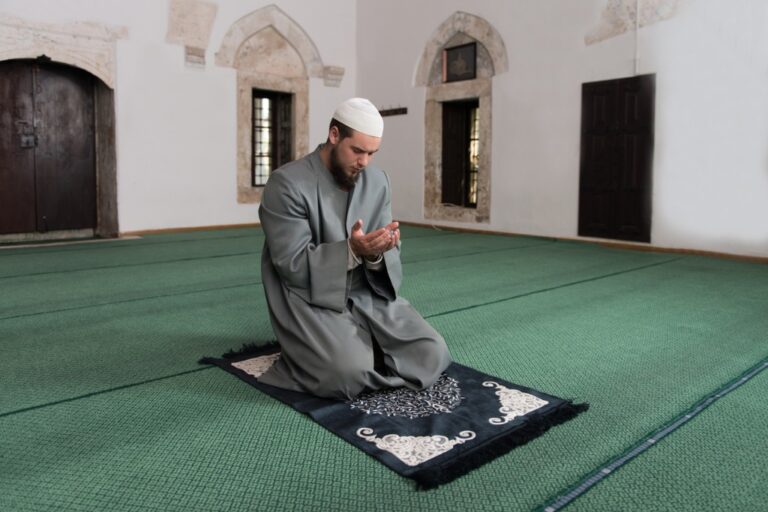Astaghfirullah Rabbi Min Kulli Dhambin Dua: Meaning, Benefits and Practical Tips
If you are a Muslim, or you are interested in becoming one, then it is likely that you might have heard of the term “Astaghfirullah Rabbi Min Kulli Dhambin Wa Atubu Ilaih”, which is a widespread term within the Muslim community and Islamic faith as a whole.
If you are unsure of what this term means in Arabic, hold up your curiosity for a while because…
In this post, we will take a closer look at this term to give you a better understanding of what it means, what power it holds, and how you can use it.
Let’s begin!
Understanding Astaghfirullah Rabbi Min Kulli Dhambin Wa Atubu Ilaih


The Dua “Astaghfirullah Rabbi Min Kulli Dhambin Wa Atubu Ilaih” is a powerful prayer for seeking forgiveness from Allah SWT and turning back to Him.
Meaning of the Dua
This Dua means, “I seek forgiveness in Allah from all my sins and repent to Him.” This powerful Dua shows great humility in front of Allah SWT by recognizing that people are weak and often make mistakes.
It emphasizes repentance, an essential part of the Islamic faith, and invites you to think about yourself and grow. When you recite this Dua with genuine regret, you make way for God’s mercy and forgiveness.
Muslims worldwide recite this Dua often to ask for forgiveness and get spiritual nourishment, better health, and physical healing through stress relief and immune system support.
When said from the heart, these Arabic words have power that affects every part of your life.
Pronunciation and Transliteration
Arabic Version
أسْتَغْفِرُ اللهَ رَبي مِنْ كُلِ ذَنبٍ وَأتُوبُ إلَيهِ
Transliteration
Astaghfirullah rabbi min kulli Dhambin wa atoobu ilaiyh
This Arabic phrase is among the many beautiful Duas in Islam, offering a simple yet profound path towards seeking Allah SWT’s forgiveness.
Each word in this Dua carries weight and respect for Allah SWT, our creator. It’s worth noting that vowel sounds and syllable stresses can vary depending on regional accents and dialects.
- Are you searching for the most accurate Athan and Prayer times? You have come to the right place! Feel free to click on the hyperlink.
Spiritual Benefits of Reciting This Dua


Reciting this Dua brings spiritual benefits such as inner peace, self-growth, and a stronger relationship with Allah SWT.
Importance of Seeking Forgiveness
Seeking forgiveness from Allah SWT regularly is an essential aspect of personal development and spiritual nourishment. As believers acknowledge their shortcomings in front of the Almighty, the act strengthens their humility.
It improves emotional well-being by removing negative thoughts, guilt, and regret from past mistakes.
Furthermore, it cleanses the soul, making more room for increased faith and devotion to Allah SWT. No sin is too great to be forgiven in Islam, demonstrating Allah’s infinite mercy toward His worshipers. Prophet Muhammad told us:
قَالَ اللَّهُ عَزَّ وَجَلَّ: سَبَقَتْ رَحْمَتِي غَضَبِي
Allah, the Exalted and Glorious, said: My mercy excels My wrath. Sahih Muslim 2751b
Thus, incorporating Istighfar (seeking forgiveness) into our daily routine can help us achieve inner peace and higher purpose in life.
Virtue of Asking for Forgiveness in Hadith


As evidenced by Hadith, asking Allah’s forgiveness is a powerful act in Islamic teachings. Prophet Muhammad said this about sinners…
كُلُّ بَنِي آدَمَ خَطَّاءٌ وَخَيْرُ الْخَطَّائِينَ التَّوَّابُونَ
“All the sons of Adam are sinners, but the best of sinners are those who are given to repentance.” Mishkat al-Masabih 2341
The benefits are enormous, as evidenced by Abu Hurairah’s Hadith, according to which Prophet Muhammad PBUH personally asked Allah’s forgiveness more than seventy times a day!
While praying for Allah’s infinite mercy, this practice emphasizes humility and admitting human errors.
Istighfar repentance promotes sincerity in worship, strengthens our relationship with Almighty Allah, and instills in us believers a sense of higher purpose.
- Download Muslim Sadiq app, and enjoy all top-notch features for everyday activities!
Message From the Life of Prophet Muhammad PBUH


Prophet Muhammad PBUH said:
إِنِّي لأَسْتَغْفِرُ اللَّهَ فِي الْيَوْمِ سَبْعِينَ مَرَّةً
“Indeed I ask Allah for forgiveness seventy times a day.” Jami` at-Tirmidhi 3259
Note that this is our Prophet who is saying this; he is the one whom Allah SWT has already forgiven, and he will be in the highest level of all heavens. But why did he ask for forgiveness on a regular basis? The reason why he did this is because of us.
He wanted to convey the message that we should ask Allah SWT for forgiveness every day, no matter how pious we become. Forgiveness is the dearest to Him as the following Hadith explains.
“Were you not to commit sins, Allah would create people who would commit sins and ask for forgiveness, and He would forgive them.” Riyad as-Salihin 423.
So, ask for forgiveness till your last breath!
Practical Application of This Dua


Integrating this Dua into daily life can be done by reciting it in the morning and throughout the day, reflecting on our actions, and seeking forgiveness sincerely from Allah SWT.
Integrating it into Daily Life
Here are some practical ways to do it:
- After Fajr prayers, begin your day by reciting this Dua.
- Make it a habit to seek forgiveness before going to bed by saying this Dua.
- Incorporate it into your morning routine to begin the day thinking of Allah’s mercy and forgiveness.
- Recitation can be done in solitude or quiet place at work or school.
- Recite it while doing daily tasks like dishwashing or gardening.
- Set reminders on your phone or computer for regular daily recitation using technology.
- Read Al Quran along with transliteration and interpretation in the easiest way possible.
Tips for Making Repentance a Daily Habit


Creating a routine of daily repentance can significantly enhance your relationship with Allah SWT and pave the way for personal spiritual growth. Here are some practical tips:
- Begin your day with this Dua. Morning is a peaceful time when you can invoke Allah’s mercy.
- Incorporate this Dua into your daily prayers (habit stacking). Because praying is already a part of your daily routine, this will strengthen your habit of seeking forgiveness.
- After studying the Quran or attending Islamic classes, recite this Dua. The holy scriptures can inspire you to seek forgiveness and guidance from Allah SWT.
- Use any free time during the day to silently recite this powerful prayer, whether during a work break or commuting.
- Try repeating this Dua whenever you notice yourself having negative thoughts or engaging in inappropriate behavior patterns; this will help reinforce its meaning in everyday situations.
- Make it a bedtime ritual to recite this Dua just before bed, asking for forgiveness for the sins you unwittingly or intentionally committed that day.
- When reciting this Dua, ask Allah SWT for His infinite mercy and grace with sincerity and humility; remember, mere repetition without heartfelt intent may not yield the desired results.
- Monitor your progress by tracking how frequently you recite this Dua and make any necessary improvements.
- Seek refuge from pride (Reya’) in all of its forms, as it directly opposes the genuine repentance process.
- Remember that consistency is essential; continue to ask for forgiveness even when it appears difficult because Allah SWT’s mercy knows no bounds.
- Looking for the Islamic holidays and important dates? Please click the hyperlink to access the up-to-date list.
Conclusion
Using the power of “Astaghfirullah Rabbi Min Kulli Dhambin Wa Atubu Ilaih,” you can open doors to spiritual healing, emotional well-being, and a closer relationship with Allah SWT.
This daily invocation is a step toward self-improvement and seeking mercy from Almighty Allah. Finally, this Dua can free people from their past mistakes while propelling them forward into a more enlightened future with increased humility and sincerity in worship.
FAQs
What does “Astaghfirullah Rabbi Min Kulli Dhambin” mean?
“Astaghfirullah Rabbi Min Kulli Dhambin” is an Arabic phrase that means “I seek forgiveness from Allah for all my sins.”
When should I recite “Astaghfirullah Rabbi Min Kulli Dhambin”?
It can be recited at any time, but it is most commonly said during repentance, seeking forgiveness, or reflecting on one’s actions.
What are the benefits of reciting “Astaghfirullah Rabbi Min Kulli Dhambin”?
Reciting it can aid in the purification of the heart, the seeking of forgiveness for past mistakes, and the strengthening of one’s relationship with Allah SWT. It also serves as a reminder to avoid committing the same mistakes again in the future.
Astaghfirullah Rabbi Min Kuli Dambin Dua: Meaning, Benefits and Practical Tips
If you are a Muslim, or are interested in becoming a Muslim, you have probably heard of the term “I ask forgiveness from God, my Lord, min kli dambin and atobo ilah,” which is a widespread term within the Muslim community and the Islamic faith. As a whole. If you're not sure what this term means in Arabic, put your curiosity on hold for a while because... In this post, we'll take a closer look at this term to give you a better understanding of what it means, what power it holds, and how you can use it. let's start!They asked forgiveness from God, the rabbi of Kuli Dambin and Atobo Elaih


Meaning of supplication
This supplication means “I ask God for forgiveness for all my sins and I repent to Him.” This powerful dua shows great humility before God Almighty by realizing that people are weak and often make mistakes. It emphasizes repentance, an essential part of the Islamic faith, and invites you to reflect on yourself and grow. When you read this supplication with genuine remorse, you are making room for God's mercy and forgiveness. Muslims around the world often recite this supplication to ask for forgiveness and obtain spiritual nourishment, better health and physical healing through stress relief and immune system support. When said from the heart, these Arabic words have the power to affect every part of your life.Pronunciation and transliteration
Arabic version I ask forgiveness from God, my Lord, for every sin and I repent to Him Voice translation I ask forgiveness from God, my Lord, from Kli Dambin Watobo Aliyeh This Arabic phrase is among the many beautiful supplications in Islam, which offer a simple and profound path towards seeking the forgiveness of God Almighty. Every word in this supplication carries weight and respect for God Almighty, our Creator. It should be noted that vowel sounds and syllable stress can vary depending on regional dialects and dialects.- Are you looking for The most accurate adhan and prayer times? You have come to the right place! Feel free to click on the hyperlink.
The spiritual benefits of reciting this supplication
The importance of asking for forgiveness
Seeking forgiveness from God Almighty regularly is an essential aspect of personal development and spiritual nourishment. When believers admit their shortcomings before God Almighty, this act strengthens their humility. It improves emotional health by removing negative thoughts, guilt and regret from past mistakes. Moreover, it purifies the soul, and opens greater room for increased faith and devotion to God Almighty. There is no sin too great to be forgiven in Islam, which demonstrates God's infinite mercy towards His servants. The Prophet Muhammad told us: God Almighty said: My mercy precedes my wrath. God Almighty said: My mercy prevails over my wrath. Sahih Muslim 2751b Therefore, incorporating forgiveness into our daily routine can help us achieve inner peace and a higher purpose in life.The virtue of seeking forgiveness in hadith


- Download the Sadiq Muslim App, and enjoy all the premium features for daily activities!
A message from the life of the Prophet Muhammad, may God bless him and grant him peace


Practical application of this supplication


Integrate it into daily life
Here are some practical ways to do this:- After Fajr prayer, start your day by reciting this supplication.
- Make it a habit to ask for forgiveness before going to bed by saying this supplication.
- Incorporate it into your morning routine to start your day thinking about God's mercy and forgiveness.
- Recitation can be done in isolation or in a quiet place at work or school.
- Read it while doing everyday tasks like washing dishes or gardening.
- Set reminders on your phone or computer for regular daily recitation using technology.
- Read Surah of the Qur’an With voice translation and simultaneous translation in the easiest possible way.
Tips for making repentance a daily habit


- Start your day with this prayer. Morning is a time of peace when you can invoke God's mercy.
- Incorporate this supplication into your daily prayers (habit stacking). Because prayer is already part of your daily routine, this will strengthen your habit of seeking forgiveness.
- After studying the Qur’an or attending Islamic classes, recite this supplication. The scriptures can inspire you to seek forgiveness and guidance from God Almighty.
- Use any free time during the day to silently recite this powerful prayer, whether during a work break or commute.
- Try repeating this supplication whenever you notice yourself having negative thoughts or engaging in inappropriate behavioral patterns; This will help reinforce its meaning in everyday situations.
- Make it a bedtime ritual to recite this prayer right before bed, and ask for forgiveness for the sins you have unintentionally or intentionally committed that day.
- When reading this supplication, ask God Almighty for His mercy and grace sincerely and humbly; Remember that mere repetition without sincere intention may not lead to the desired results.
- Monitor your progress by tracking how often you recite this supplication and make any necessary improvements.
- Seek refuge from hypocrisy in all its forms, as it directly opposes the process of true repentance.
- Remember that consistency is essential; Keep asking for forgiveness even when it seems difficult because the mercy of God Almighty is limitless.
- Are you looking for Islamic holidays And important dates? Please click the hyperlink to access the updated list.







